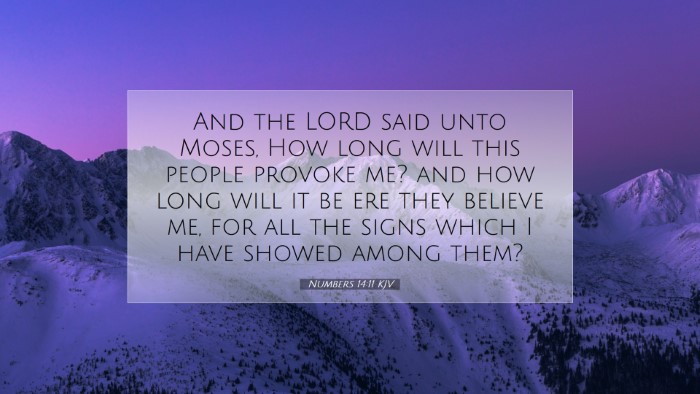Commentary on Numbers 14:11
Numbers 14:11 states:
"And the LORD said unto Moses, How long will this people provoke me? and how long will it be ere they believe me, for all the signs which I have shewed among them?"
Introduction
This verse encapsulates a pivotal moment in Israel’s wilderness journey. It reveals God's frustration with Israel's persistent disbelief in light of His numerous miracles. Various public domain commentaries provide deep insights into the theological implications of this scripture.
Contextual Background
Prior to this verse, the Israelite community had received a negative report from the spies regarding the Promised Land. Their fear and rebellion against God's command led to a deep-seated distrust. The context highlights how witnessing miracles does not guarantee faith, a theme echoed through scriptural history.
Divine Frustration
Matthew Henry notes that God's inquiry to Moses, "How long will this people provoke me?" serves as a clear reflection of divine patience reaching its limit. God's use of the term "this people" signifies a distancing from Israel due to their obstinate behavior, reminiscent of a frustrated parent addressing a disobedient child.
In contrast, Albert Barnes emphasizes the repeated instances of miraculous signs that God provided, suggesting that the Israelites' lack of faith was both a moral failure and a challenge to God's authority. Their persistence in disbelief provoked God, consistent with the notion that repeated exposure to divine signs should cultivate faith rather than doubt.
Assessment of Faith
The verse poses a rhetorical question that probes the heart of faith itself. Adam Clarke observes that God’s question highlights the relationship between belief and action. The Israelites had seen signs but failed to internalize these experiences into a living faith, thereby translating divine signs into trust in God's promises.
This underscores a significant theological principle: true faith requires not just acknowledgment of God's power but a deep-seated trust in His character and promises, especially during trials.
The Nature of Provocation
In examining the term "provoke," Matthew Henry emphasizes that it is not merely the act of disbelief that angers God but the ongoing defiance that this disbelief signifies. This provocation reveals a stubborn heart that continues to challenge divine instructions and desires.
Additionally, Albert Barnes points out that this provocation stems from a failure to recognize God's steadfastness through trials. Despite witnessing God's interventions, the people’s fear overshadowed their experiences, leading them to question God's fidelity to His promises.
Relevance to Modern Believers
This verse serves as a cautionary tale for contemporary believers. Adam Clarke suggests that while believers today may not see miracles in the same manner the Israelites did, the faithful are still called to respond to the myriad ways God manifests His presence in their lives. This lesson is critical for preaching and teaching within churches.
- The necessity of faith amidst fear and uncertainty.
- The importance of reflecting on past experiences of God’s faithfulness.
- Understanding the seriousness of provoking God through unbelief.
Conclusion
Numbers 14:11 encapsulates profound insights into the dimensions of faith and the nature of God's relationship with His people. The commentaries from Matthew Henry, Albert Barnes, and Adam Clarke reveal a unified message: that acknowledging God's power invites a corresponding responsibility to trust Him wholeheartedly.
This verse invites theologians, pastors, and students alike to reflect on their relationship with God in light of His past faithfulness and challenges them to cultivate a living faith that thrives beyond circumstances.


